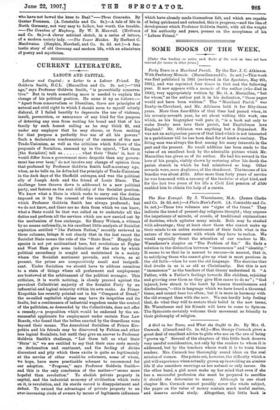CURRENT LITERATURE.
LABOUR AND CAPITAL.
Labour and Capital : a Letter to a Labour Friend. By Goldwin Smith, D.C.L. (Macmillan and Co. 2s. net.)—" Old age," says Professor Goldwin Smith, "is proverbially conserva- tive." But in truth something more is needed to explain the change of his political position. He sums it up as follows :— " Apart from conservatism or liberalism, there are principles of natural and civil right to which I should seem to myself utterly disloyal, if I failed heartily to deprecate the use of violence, insult, persecution, or annoyance of any kind for the purpose of deterring any man from making his bread and that of his family by such honest calling as he may think fit, and under any employer that he may choose, or from making for that purpose a perfectly free use of all his powers." Such a declaration condemnatory of the excesses of the new Trade.IInionism, as well as the criticism which follows of the proposals of Socialism, summed up in the appeal, "Let them
[the Socialists] tell us what their State' is, how it would differ from a government more despotic than any govern- ment has ever been," do not involve any change of opinion from that professed by Professor Goldwin Smith half-a-century ago, when, as he tells us, he defended the principle of Trade.ITnionism in the dark days of the Sheffield outrages, and was the political ally of Joseph •Arch and the friend of Louis Blanc. The challenge here thrown down is addressed to a new political party, and fastens on the real difficulty of the Socialist position. We know what a State is which seeks to carry out the duties imposed on it by the consent of the conservative Liberalism which Professor. Goldwin Smith has always professed ; but we do not know, and there are no data from which we can know, what a State would be that was called on to undertake all the duties and perform all the services which are now carried out by the mechanism of free exchange. Sir Henry Wrixon, a witness by no means unfriendly, in his excellent little analysis of Socialist aspiration entitled ' 'The Pattern Nation," recently reviewed in these columns, brings it out clearly that in the last resort the Socialist State means the rule of the "State Boss." Happily the species is not yet acclimatised here, but revelations at Poplar and West Ham give some indications of the arts by which political ascendency is sought and maintained in a society where the Socialist sentiment prevails, and where, as at present, the prizes are comparatively small and insignifi- cant. Under Socialism we should have to address ourselves to a state of things where all preferment and employment are bestowed at the arbitrament of the political manager. This criticism, it is worth noticing, is closely pressed against the prevalent Collectivist majority of the Socialist Party by an influential and logical minority within its own ranks. As Prince Kropotkin has recently pointed out in his "Conquest of Bread," the so-called capitalist regime may have its iniquities and its faults, but a continuance of industrial wagedom under the control of the politician, as demanded by the Collectivists, does not offer a remedy,—a proposition which would be endorsed by the un- successful applicants for employment under certain Poor Law Boards, who found that the bribes exacted by the Guardians were beyond their means. The Anarchical Socialism of Prince Kro- potkin and his friends may be disavowed by Fabian and other lees logical Socialists, but until they give an answer to Professor Goldwin Smith's challenge, "Let them tell us what their ' State' is," we are entitled to say that their case rests merely on declamation and sentiment, and the feeling of divine discontent and pity which these excite is quite as legitimately at- the service of other would-be reformers, some of whom, we hope, have more practicable schemes to recommend for our adoption. "Progress," says Professor Goldwin Smith— and this is the only conclusion of the matter—" seems more hopeful than revolution." To abolish private property in capital, and the industrial economy of civilisation which rests on it, is revolution, and its sterile record is disappointment and defeat. To extend the advantages of private property to an ever-increasing circle of owners by means of legitimate-influences which have already made themselves felt, and which are capable of being quickened and extended, this is progress,—and the line of development which Professor GoldwinSmith, with all the weight of his authority and years, presses on the acceptance of his "Labour Friend."










































 Previous page
Previous page